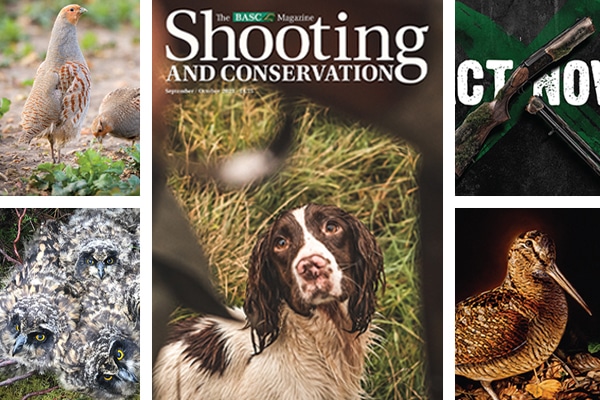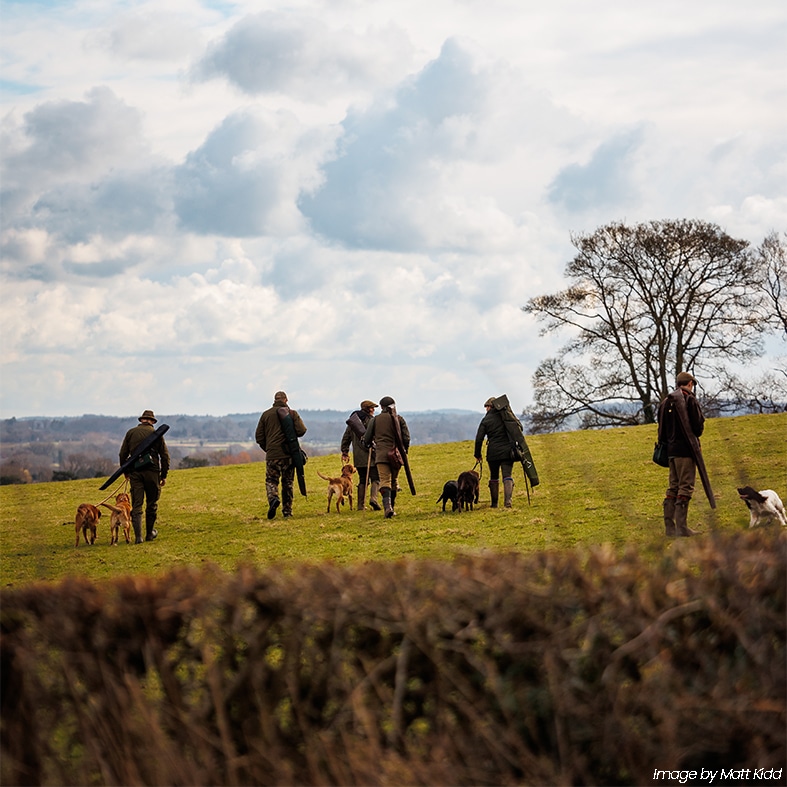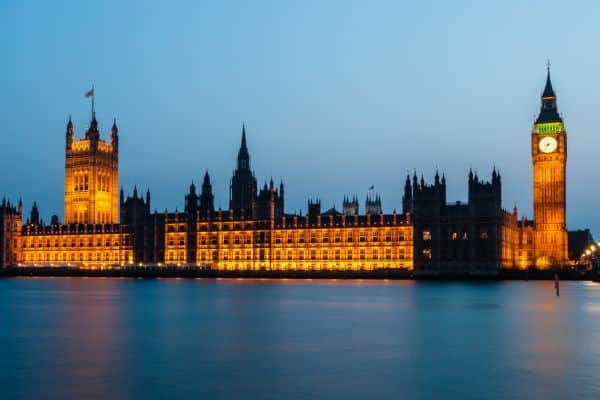
Shooting and Conservation
Find out everything you need to know about the UK’s largest-circulation field sports magazine.
Get information on the legal shooting season for mammals and birds in the UK.
Learn about our current conservation projects and how you can get involved.
Comprehensive information and advice from our specialist firearms team.
Everything you need to know about shotgun, rifle and airgun ammunition.
Find our up-to-date information, advice and links to government resources.
Everything you need to know on firearms law and licensing.
All the latest news and advice on general licences and how they affect you.


Media Policy and campaigns Our positions
There are five key areas in which we are working to fight for shooting.
BASC will protect the lawful right to the ownership and use of firearms.
BASC will protect the lawful right to ownership and use of effective and affordable ammunition for firearms.
BASC will protect and promote the lawful participation by people of all ages and abilities in shooting.
BASC will support wildlife, habitat and land management practices that support the sustainable harvest of quarry species for food.
BASC will support high standards in shooting through education, scientific research and self-regulation.
BASC is opposed to the licensing of airguns in England and Wales for the following reasons.
Current legislation already addresses the issue of storage and under 18 access. Airgun manufacturers already supply products that are safe, fit for purpose and fully comply with British firearms and consumer products law.
The police already struggle to properly service existing certificate holders and simply do not have the resources to deal with millions of additional certificates. Proposing restrictions on airgun ownership and use risks closing off pathways into shooting.
We will challenge proposals to remove or amend the right to take a sustainable harvest of wild bird species. We will actively promote self-regulation as the best and most flexible approach to evidence-based issues in relation to wild birds.
The evidence to underpin our approach will be developed using our Sustainable Shooting Framework and we will lobby for the sustainable harvest of additional wild bird species when appropriate.
Birds of Conservation Concern (BoCC) green, amber and red listings are not an effective tool for making ‘stand-alone’ management decisions for any bird species because taking such a simplistic approach would risk making ineffective and perverse decisions particularly in relation to shooting.
BASC will oppose proposals to remove bird species from quarry lists or general licences when such proposals are based solely on a BoCC amber or red listing. BASC supports the licenced targeted taking or killing of BoCC amber or red listed bird species for the purposes of conservation, agriculture and public safety. The shooting of quarry species of birds should comply with our definition of Sustainable Shooting.
Controlled burning of vegetation in the uplands is an essential tool for grazing, livestock and wildfire management and mitigation.
Burning can increase biodiversity and its use is highly site dependent. It is therefore incorrect to say that you should always burn or never burn.
We work hard to encourage young people into our sport, for example through our Young Shots programme. Teaching the responsible and safe use of firearms to younger people removes the myths that surround firearms and teaches both self-control and responsibility towards others.
BASC wants an efficient, cost-effective, robust system of firearms licensing that protects public safety and provides excellent service to the shooting community.
We believe that all parties in the licensing process in England, Wales and Scotland should have statutory obligations and this must include GPs. We are working to achieve a single firearms licensing body with commons standards and training to administer the disparate processes currently being undertaken by 44 police forces.
Compliance with the English fox snaring code should be made a legal requirement (currently it is voluntary). Prohibition of the sale of non- code compliant snares and a requirement that any snare must be set in accordance with the Code.
Operators would be required to undergo training and certification. Consideration of registration and identification of snares to users (via unique ID tagging). Support the development of other snaring codes/advice for other species, when and if applicable.
We support the introduction of legislation in Wales to prohibit the use of non-code compliance snares and other elements relevant to their use (in Wales).
Such elements would include:
BASC recognises the need for game bird laying and rearing methods and systems to meet high animal welfare standards.
We will work with other shooting and farming organisations to ensure that research and knowledge is available to allow game rearing to adapt to meet the needs of the birds.
BASC recognises the importance that the animal welfare legislation is adhered to by individuals and business involved in rearing game birds. Compliance with the legislation should be underpinned by the Statutory Code and enforceable throughout the UK through Government agencies, shoot assurance schemes and membership organisations.
We also recognise it is important that imported pheasants and partridges are reared to the same animal welfare standards in the UK. Ideally this should be achieved by the suppliers being registered and compliant with relevant UK shoot assurance schemes.
We want to ensure that people taking and killing ‘pest bird’ species in the UK can do so confident that they are acting lawfully via clear and understandable rules with minimal bureaucratic burden.
Any wildlife licencing requirements must facilitate timely and, where necessary, preventative actions. We will achieve that by continuing to seek improvements to wildlife licensing rules within the existing legal frameworks, and where opportunities arise, seeking new legal frameworks for the taking and killing of bird species.
BASC will continue to oppose proposals to license grouse shoots in England and Scotland because there is already sufficient legislation and best practice in place to address concerns about vegetation burning and the illegal killing of birds of prey.
We will also oppose proposals for any further restrictions on activities essential to the effective management of grouse moors in England and Scotland, which includes shooting grouse, pest and predator control, prescribed vegetation burning, medicated grit, and moorland access, because such restrictions would undermine the viability of grouse moors and the social, environmental and economic benefits they provide.
BASC is opposed to a close season for brown hares in England and Wales and is opposed to a change in the legal status of mountain hares in England.
We strongly oppose a ban on hunting with dogs, and believes land owners and managers should be able to choose the most effective methods of pest and predator control for their circumstances.
BASC equally strongly opposes unlawful protest action because it is morally wrong and likely to be counterproductive.
Avoidance of restriction where lead discharge and risk are ‘negligible’ or ‘nil’. Avoidance of restriction where socio-economic impact assessments demonstrate non-viability of transition.
Pursue derogation allowing use of lead where risks can be limited by containment / use in appropriate venue settings allowing for lead recovery and risk avoidance around run-off, wildlife and livestock. Pursue transition periods that allow for development of further products and manufacturing capacity to meet market demands. Such transitions should be informed by the trade and manufacturers.
We accept that in some settings lead ammunition poses an exposure risk that must be controlled. Managing proven risks is beneficial to the environment and the long-term future of shooting. It is why the sector has already committed to a voluntary transition away from lead gunshot for live quarry shooting and has ambitions to source shot game from lead free supply chains.
Restrictions on the use of lead gunshot for live quarry shooting must be evidence based and proportionate to the evidenced risk.
We encourage the regulator to work closely with the sector to secure realistic transition periods that account for global supply chain issues.
We remain committed to the shooting organisations’ five-year transition away from lead gunshot for live quarry shooting with shotguns.
We are opposed to current restriction proposals. It is our view that lead gunshot can continue to be used for most forms of shotgun target shooting where risks are appropriately and proportionately controlled, including the application of existing directives and regulations.
Restriction on the use of lead ammunition for live quarry shooting must be evidence based and proportionate to the risk. We encourage the regulator to work closely with the sector to secure realistic transition periods that account for global supply chain issues.
If transition periods are to be defined by calibre, we believe that large calibre rifles should be any centrefire calibre of 6.5mm and above.
Small calibre rifles should apply to any centrefire calibre smaller than 6.5mm, all rimfire calibres and any lead projectiles not defined as gunshot but should exclude airgun ammunition. The sector has existing ambition to source game from lead free supply chains.
We are opposed to current restriction proposals. It is our view that lead ammunition can continue to be used for most forms of target shooting where risks are appropriately and proportionately controlled through the application of existing directives and regulations.
We are opposed to current restriction proposals. It is our view that lead airgun ammunition can continue to be used for live quarry and target shooting where risks are appropriately and proportionately controlled through the application of existing directives, regulations, and best practice guidance.
In consideration of wildlife, the environment and to ensure a market for the healthiest game products, at home and abroad, we wish to see an end to both lead and single use plastics in ammunition used by those taking all live quarry with shotguns within 5 years.
The shooting community must maintain its place at the forefront of wildlife conservation and protection, and sustainability in our practices is of utmost importance. It is twenty years since wildfowlers stopped using lead, and we believe it is necessary to begin a further phased transition.
Recently, there have been significant developments in the quality and availability of non-lead shotgun cartridges and plastic cases can now be recycled. For the first time, bio-degradable shot cups for steel shot, with the necessary ballistics to ensure lethality, are available.
These welcome advances are continuing at an ever-quickening pace, in response to demand from a changing market. Such advances mean that over the coming years a complete transition is achievable.
We are jointly calling for our members to engage in this transition and work with us, the Gun Trade Association and the cartridge manufactures to ensure that further viable alternatives are developed for every situation involving live quarry. This is an opportunity to take the initiative and ensure the reputation of the shooting community, as custodians of the countryside, is both maintained and enhanced.
BASC supports industry-led voluntary training and is opposed to the introduction of mandatory competence testing for any form of shooting.
BASC is examining options for ensuring its own use of single-use plastics is reduced and is also urging members to plan ahead for next season.
BASC is committed to the fight against raptor persecution.
We work to reduce raptor persecutions in the following ways:
(a) BASC supports wider partnership working to tackle raptor persecution.
(b) BASC works with the Shoot Liaison Committee to deliver a voluntary approach by encouraging landowners, shoot managers and gamekeepers to reduce raptor persecution and disturbance.
(c) BASC ensures that the research and knowledge is available to manage raptors in situations where there is conflict with game management.
(d) BASC ensures there is the legislative framework and support from Government agencies to allow raptor numbers to be managed where levels prevent sustainable sporting shooting.
(e) BASC should engage with the development of and support raptor species recovery plans e.g. the England Hen harrier action plan.
(f) BASC should help develop the resource and ability to collect and publish evidence on the factors affecting raptors survival rate.
(g) BASC should support increased penalties for wildlife crime.
(h) BASC should promote the benefits of grouse moor shooting to the public alongside a campaign to educate and raise shooters awareness of the long term impact of raptor persecution on shooting.
We are opposed to the introduction of shoot licensing as shooting is already subject to appropriate regulation. There is no evidence that a licensing scheme would be any more effective, but it would place a disproportionate burden on shooting.
Snares legally set as a holding or restraining device are a necessary and effective countryside management tool used by conservationists, farmers, gamekeepers and land managers. BASC promotes compliance with best practice and codes of practice for the use of snares.
We will support species reintroductions where all other avenues of species recovery have been explored or attempted unsuccessfully and where evidence demonstrates that reintroduction would not only be successful but is necessary for landscape-scale species recovery.
Species reintroductions, especially those of wide-ranging species, require consultation and joined-up working between landowners and managers and BASC is supportive of these types of landowner-driven conservation collaborations.
We believe that species reintroduction projects should adhere to International Union for Conservation of Nature (IUCN) guidelines on reintroductions, relevant country level reintroduction codes and have long-term monitoring and management plans in place to trigger nonlethal or lethal control options should undesirable outcomes occur.
BASC supports the sustainable harvest of wildlife in the UK and overseas and the import and export of trophies arising from such harvesting where they are clearly proven to be from a sustainable source; noting that well-regulated trophy hunting programmes play an important role in delivering benefits for both nature and people.
We support the management and control of wild boar as detailed within the best practice guidance produce by the Deer Initiative.
BASC will do everything within its power to promote and protect the sport of wildfowling. It will encourage and facilitate entry to the sport, support and extend the club structure and represent the sport at all levels.
We will oppose at all levels any restriction being placed upon wildfowling that is not, in the opinion of both the Council and its Wildfowling Liaison Committee, capable of being shown by clear evidence to be necessary for the future of wildfowling in the UK and the wildfowl and wildlife habitat on which wildfowling depends.
BASC is opposed to changes in the shooting season or the removal of woodcock from the quarry list in the UK because there is no evidence that shooting is detrimental the resident breeding population.
We will encourage its members to continue to take part in woodcock count surveys and bag data surveys and to undertake woodland conservation work targeted at breeding habitats for woodcock.
BASC will promote and encourage the voluntary restraint not to shoot woodcock until the end of November to minimise the risk of resident birds being shot disproportionately to migratory birds.
We will also encourage research aimed to increase understanding of woodcock ecology, population dynamics and the reasons for the breeding population decline. This research must be undertaken at a European and UK level.
UK research needs to be at both an individual country-specific level and where appropriate at a localised level, to ensure evidence-based decisions can be made which reflects both the country and local specific circumstances.

Find out everything you need to know about the UK’s largest-circulation field sports magazine.


We work to promote the interests of shooting at Westminster, in the devolved parliaments and in Brussels.
Sign up to our weekly newsletter and get all the latest updates straight to your inbox.
© 2023 British Association for Shooting and Conservation. Registered Office: Marford Mill, Rossett, Wrexham, LL12 0HL – Registered Society No: 28488R. BASC is a trading name of the British Association for Shooting and Conservation Limited which is authorised and regulated by the Financial Conduct Authority (FCA) under firm reference number 311937.
If you have any questions or complaints about your BASC membership insurance cover, please email us. More information about resolving complaints can be found on the FCA website or on the EU ODR platform.
This website uses cookies so that we can provide you with the best user experience possible. Cookie information is stored in your browser and performs functions such as recognising you when you return to our website and helping our team to understand which sections of the website you find most interesting and useful.
Strictly Necessary Cookie should be enabled at all times so that we can save your preferences for cookie settings.
If you disable this cookie, we will not be able to save your preferences. This means that every time you visit this website you will need to enable or disable cookies again.
This website uses Google Analytics to collect anonymous information such as the number of visitors to the site, and the most popular pages.
Keeping this cookie enabled helps us to improve our website.
Please enable Strictly Necessary Cookies first so that we can save your preferences!
More information about our Cookie Policy